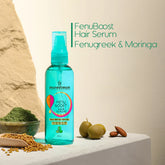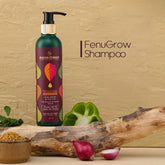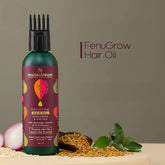Common Hair Problems and their Ayurvedic Remedies

Hair tends to come in a multitude of styles, tints, lengths, textures, and kinds. Nonetheless, no matter what type of hair you have, almost everyone suffers from at least one hair problem. Your hair's health needs consistent devotion, care, and love. Hair is vulnerable to environmental, dietary, and general health changes. Identifying these changes and leaning to Ayurveda and its philosophy for coping techniques will help preserve excellent hair health. In this article, we will discuss some of the common hair problems and their ayurvedic remedies. Keep reading to get some interesting insights!
Common Hair Problems and Ayurvedic Remedies to treat them
Let us look at some of the most common hair problems, as well as their origins, symptoms, and Ayurvedic remedies.
Dandruff induces white flakes to appear on the scalp. It is a non-inflammatory, innocuous skin condition that impacts the scalp and can cause hair loss. Dandruff exists in two varieties: dry and moist. A dry scalp is particularly common in the winter when dry conditions and hot water absorb the natural oil from the scalp. Oily dandruff develops when the scalp glands generate excessive sebum, which collects on the scalp with dust and creates flakes.
Symptoms
- Dry Scalp: Dry scalp refers to the scalp that has no or little oil. Dryness on the scalp is a frequent dandruff sign.
- Greasy Hair and Scalp: Increased sebum production in the scalp results in greasy hair and scalp.
- Redness on the scalp: Your scalp becomes red as a result of constant itching or irritation.
Factors that give rise to Dandruff
Ayurvedic Remedies
For Dry Dandruff:
- Yogurt + Egg White
- Yogurt + Papaya
- Honey + Lemon Juice
- Curry Leaves
- Aloevera
- Fenugreek Seeds + Heena + Lemon Juice
- Green Guard
- Neem Leaves + Curd
- Hibiscus Flower
- Amla + Chandan Powder
It is the most common hair problem that anyone may experience.
Symptoms
- Hairline receding: The first indication of hair loss is frequently thinning hair above the temples and throughout the head.
- Baldness: Baldness refers to the irreversible loss of hair from the scalp.
- Thinning of hair: If you can see your scalp throughout your hair, it indicates that your hair is becoming thinner.
- Bald Patches: Hair loss in small, plainly noticeable spots. It is most common in the center of the scalp.
Factors that give rise to Hair Fall
- Imbalance of Hormones: Hair loss is frequent in women during pregnancy, menopause, and menstruation. These are the times when hormones in a woman's body shift fast.
- Stress: Telogen effluvium is a condition in which a person has transient hair loss as a result of stress.
- Infection on the scalp: Any scalp infection produces itching, dryness, and redness on the scalp, as well as damage to the hair follicles.
- Excessive use of chemicals: Shampoos and conditioners frequently contain chemicals such as sulfates, sodium chloride, parabens, and propylene glycol. These substances have an impact on the health and development of the hair.
- When combing and shampooing your hair, be careful.
- Vitamins and minerals should be included in your diet.
- Massage your scalp with herbal oil for 30 minutes at least twice a week.
- To avoid the negative effects of chemicals, adopt natural hair care products.
- Yoga should be practiced on a regular basis to increase hair growth and relieve stress.
- Use a herbal hair mask to hydrate and nourish your hair.
Split Ends

Split ends are caused by the division of hair shafts from the ends.
Symptoms
- Frizzy Hair: Frizzy hair is defined as dry, lifeless hair that fuzzes up.
- Hair Breakage: The hair breaks throughout its length rather than at the roots.
- Damaged Hair: Damaged hair is defined as dry, dull, and thin hair that is prone to falling out.
Factors that give rise to Split Ends
- Dry Hair: Split ends occur when your hair's ends become brittle, dry, and ragged.
- Heat Styling: Curling irons and hair straighteners harm your hair by removing moisture and leaving it dry.
- Colored Hair: Hair coloring contains chemicals that deplete your hair's natural moisture and create split ends.
Ayurvedic Remedies
- Choose Hair-Friendly Accessories: To avoid hair damage, use soft-textured rubber bands and headbands.
- Gentle Hair Brushing: To untangle your hair, never brush it when it is damp, and always use a wide-toothed brush.
- Heat-proof your Hair: Employ heat styling products sparingly and wear a hat while going out in the sun.
- Regular trimming is the key: Trimming your hair on a regular basis helps to reduce split ends and provides your hair with a healthy appearance.
It is a condition in which the hair begins to grey at a young age.
Symptoms
- Hair turning Grey: The color of one's hair turns grey or white before the age of 20 or 30.
Factors that give rise to Premature Greying
- Stress: Pitta dosha and melanocyte development are both aggravated by stress.
- Smoking: Toxins in cigarettes harm hair follicles and create grey hair. Smoking also reduces blood flow to the hair follicles by constricting blood vessels.
- Decrease in Melanin Production: Melanin is a pigment that determines the natural color of your hair. Melanin production in hair follicles declines with age and hormonal imbalance, resulting in grey hair.
- Pitta Dosha Imbalance: As per Ayurveda, an imbalance of Bhrajaka Pitta- a subtype of Pitta dosha- lowers melanin production and causes premature graying of hair.
Ayurvedic Remedies
- Consumption of Vitamin B-12: Vitamin B-12 aids in the regulation of melanin synthesis in hair follicles.
- Yoga & Exercise: They aid in stress reduction and dosha equilibrium.
- Ayurvedic Herbs: Herbs such as Bhringraj, Triphala, Vibhitaka, Henna, and Hibiscus can help prevent premature greying.
- Diet Changes: Consume nuts and green leafy vegetables to supplement your iron, copper, and catalase levels.
Greasy Hair

Hair becomes greasy due to an overproduction of sebum (natural oil) in the scalp.
Symptoms
- Rashes on the scalp: Greasy hair collects debris, causing irritation on the scalp. It produces scalp rashes and redness.
- Dandruff: Oily dandruff develops when your hair follicles create an excessive amount of sebum.
- Sticky Hair: The presence of oiliness and stickiness in the hair after shampooing.
- Hair Fall: Accumulation of dust and grease on the scalp prevents your hair follicles from breathing, resulting in hair loss.
Factors that give rise to Premature Greying
Agitated Kapha Dosha: According to Ayurveda, the overproduction of sebum in the scalp is caused by the Kapha and Pitta doshas. Individuals who have a Kapha-Pitta dosha dominance are more prone to oily hair.- Aggressive Conditioning: Excessive conditioner usage on oily hair can aggravate the issue by making it more greasy.
- Irregular Washing: Not shampooing on a regular basis causes greasy hair because the collected extra oil and filth sit on the scalp and make it oily.
- Genetic factors: Your hair type is determined by your genes. If you have a family history of oily scalp, you are likely to develop it as well.
Ayurvedic Remedies
- Change Your Dietary Habits: Limit your intake of processed and fatty foods.
- Regular Shampooing: Shampoo your hair twice or three times a week using herbal or natural shampoo.
- Resist Using Heavy Hair Styling Products: Avoid using heavy hair styling products such as hair wax and hair creams.
- Ayurvedic Herbs: Ayurvedic remedies such as Shikakai, Reetha, Triphala, and Kalonji can be used to cleanse your hair. You may also cure oily hair using a hair mask prepared from herbs such as Kumari, Amla, Ganji, Henna, and Thyme.





